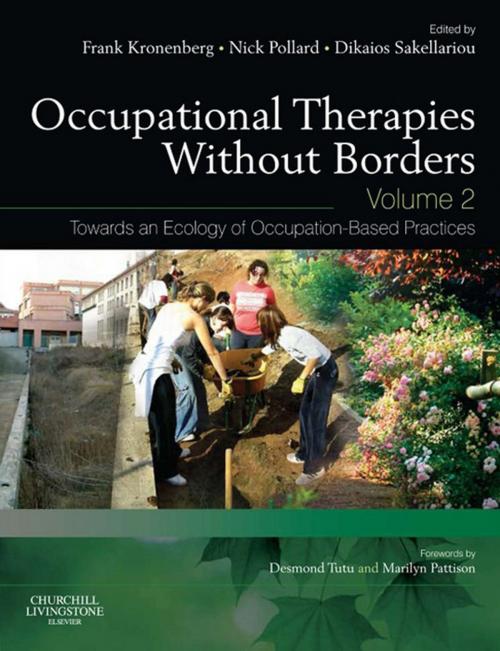Occupational Therapies without Borders - Volume 2 E-Book
Towards an ecology of occupation-based practices
Nonfiction, Health & Well Being, Medical, Allied Health Services, Occupational Therapy| Author: | ISBN: | 9780702049118 | |
| Publisher: | Elsevier Health Sciences | Publication: | October 24, 2011 |
| Imprint: | Churchill Livingstone | Language: | English |
| Author: | |
| ISBN: | 9780702049118 |
| Publisher: | Elsevier Health Sciences |
| Publication: | October 24, 2011 |
| Imprint: | Churchill Livingstone |
| Language: | English |
The companion text to Occupational Therapy without Borders - Volume 1: learning from the spirit of survivors!
In this landmark text writers from around the world discuss a plurality of occupation-based approaches that explicitly acknowledge the full potential of the art and science of occupational therapy. The profession is presented as a political possibilities-based practice, concerned with what matters most to people in real life contexts, generating practice-based evidence to complement evidence-based practice. As these writers demonstrate, occupational therapies are far more than, as some critical views have suggested, a monoculture of practice rooted in Western modernity. Nobel Peace Laureate Desmond Tutu captures the ethos of this book, which essentially calls for engagements in the service of a purpose that is larger than the advancement of our profession's interests: "Your particular approach to advancing our wellbeing and health strikes me as both unique and easily taken for granted. Whilst you value and work with medical understandings, your main aim seems to go beyond these. You seem to enable people to appreciate more consciously how what we do to and with ourselves and others on a daily basis impacts on our individual and collective wellbeing. As occupational therapists you have a significant contribution to make [.] allowing people from all walks of life to contribute meaningfully to the wellbeing of others."
- Links philosophy with practical examples of engaging people in ordinary occupations of daily life as a means of enabling them to transform their own lives
- Includes contributions from worldwide leaders in occupational therapy research and practice
- Describes concrete initiatives in under-served and neglected populations
- Looks at social and political mechanisms that influence people’s access to useful and meaningful occupation
- Chapters increase diversity of contributions – geographically, culturally and politically
- Emphasis on practice, education and research maintains academic credibility
- A glossary and practical examples in nearly every chapter make text more accessible to students
The companion text to Occupational Therapy without Borders - Volume 1: learning from the spirit of survivors!
In this landmark text writers from around the world discuss a plurality of occupation-based approaches that explicitly acknowledge the full potential of the art and science of occupational therapy. The profession is presented as a political possibilities-based practice, concerned with what matters most to people in real life contexts, generating practice-based evidence to complement evidence-based practice. As these writers demonstrate, occupational therapies are far more than, as some critical views have suggested, a monoculture of practice rooted in Western modernity. Nobel Peace Laureate Desmond Tutu captures the ethos of this book, which essentially calls for engagements in the service of a purpose that is larger than the advancement of our profession's interests: "Your particular approach to advancing our wellbeing and health strikes me as both unique and easily taken for granted. Whilst you value and work with medical understandings, your main aim seems to go beyond these. You seem to enable people to appreciate more consciously how what we do to and with ourselves and others on a daily basis impacts on our individual and collective wellbeing. As occupational therapists you have a significant contribution to make [.] allowing people from all walks of life to contribute meaningfully to the wellbeing of others."
- Links philosophy with practical examples of engaging people in ordinary occupations of daily life as a means of enabling them to transform their own lives
- Includes contributions from worldwide leaders in occupational therapy research and practice
- Describes concrete initiatives in under-served and neglected populations
- Looks at social and political mechanisms that influence people’s access to useful and meaningful occupation
- Chapters increase diversity of contributions – geographically, culturally and politically
- Emphasis on practice, education and research maintains academic credibility
- A glossary and practical examples in nearly every chapter make text more accessible to students















